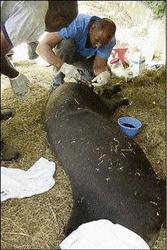
Minor surgery being done on a Tapir at Hope Zoo.
The contribution of veterinary medicine to Jamaican society is varied and vital. Most people consider a vet to be simply a doctor who looks after sick animals, but the profession is far more than this. Here is a look at veterinary medicine in Jamaica.
CLINICAL PRACTICE
This is the area most people are familiar with and it has several branches including companion animal practice, food-producing animal practice, equine practice and exotic animal practice and even more specialised areas.
VETS IN PRIVATE COMPANIES
Veterinarians are employed by several private companies involved in the livestock sector such as Jamaica Broilers, Caribbean Broilers, Windalco and Jamaica Livestock Association. Their roles vary from managerial to field work.
REGULATORY VETERINARY ACTIVITIES
This is the role of the Veterinary Services Division (VSD) of the Ministry of Agriculture. It includes controlling the import/export of animals and animal products (issuing of permits, inspection of processing plants or facilities, quarantine), disease control programmes such as tuberculosis/brucellosis and screw-worm eradication, surveillance for animal diseases, Veterinary Diagnostic Laboratory, residue testing (checks for drug/chemical residues in animal products). VSD activities are vital to the fish and seafood industries to maintain ability for export to places like the European Union.
The Veterinary Public Health Unit of Ministry of Health monitors food safety and zoonotic diseases (transmissible from animals to humans).
TEACHING AND RESEARCH
Veterinarians the world over are involved in research at all levels, studying diseases, developing new drugs, diagnostics, treatments, developing improved strategies for animal production, food safety and security.
In the English-speaking Caribbean, the School of Veterinary Medicine at the University of the West Indies in Trinidad is currently the main source of new veterinary graduates, though some still attend other universities within the region and around the world.

